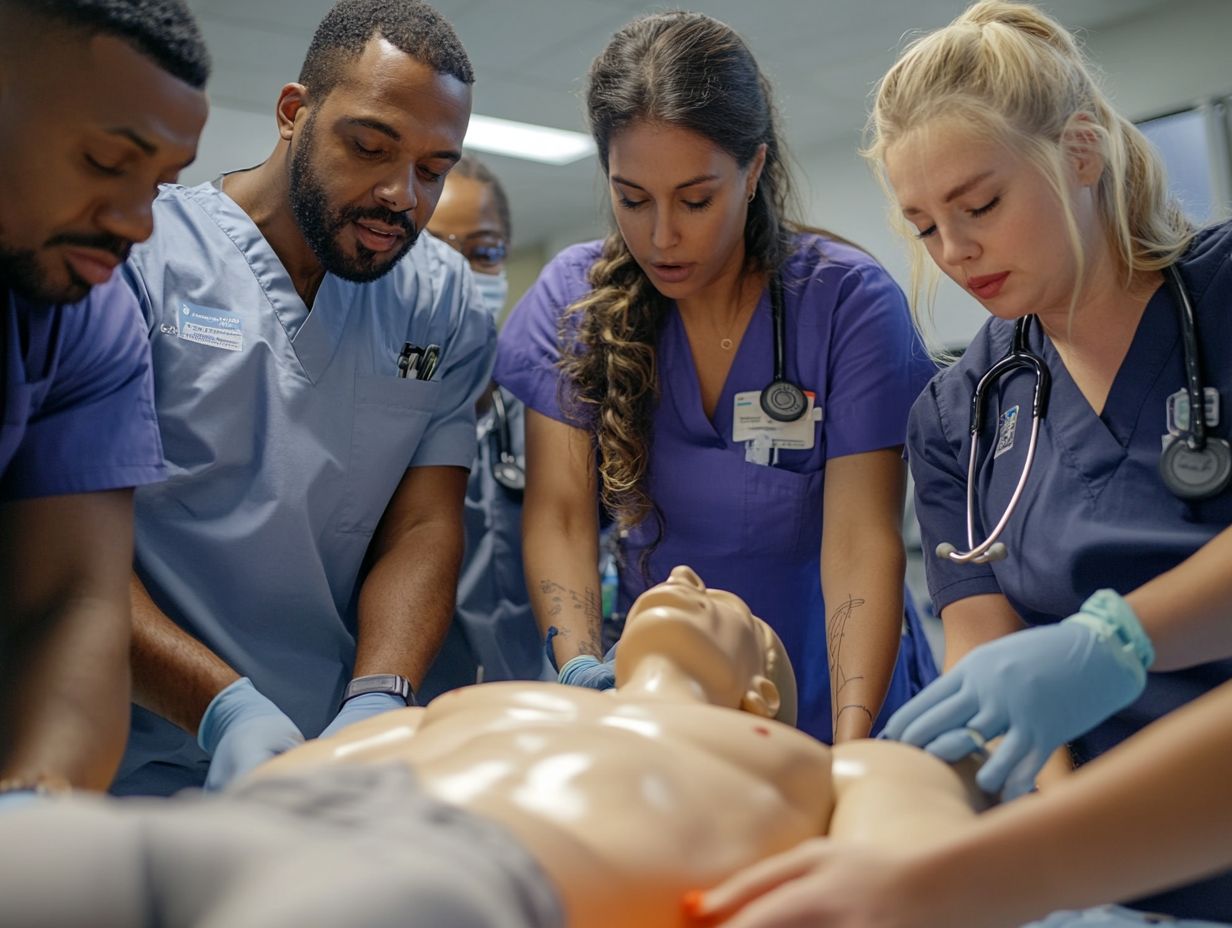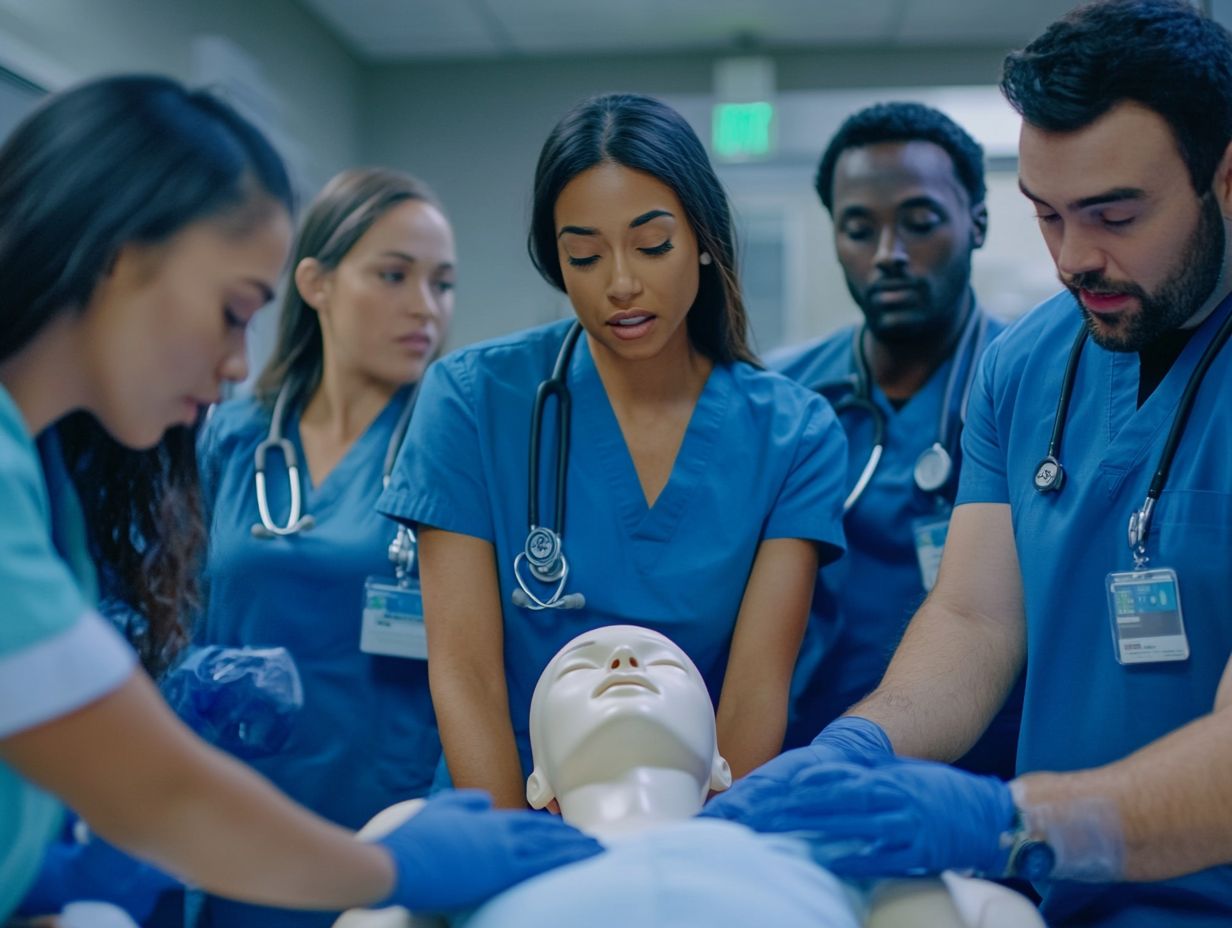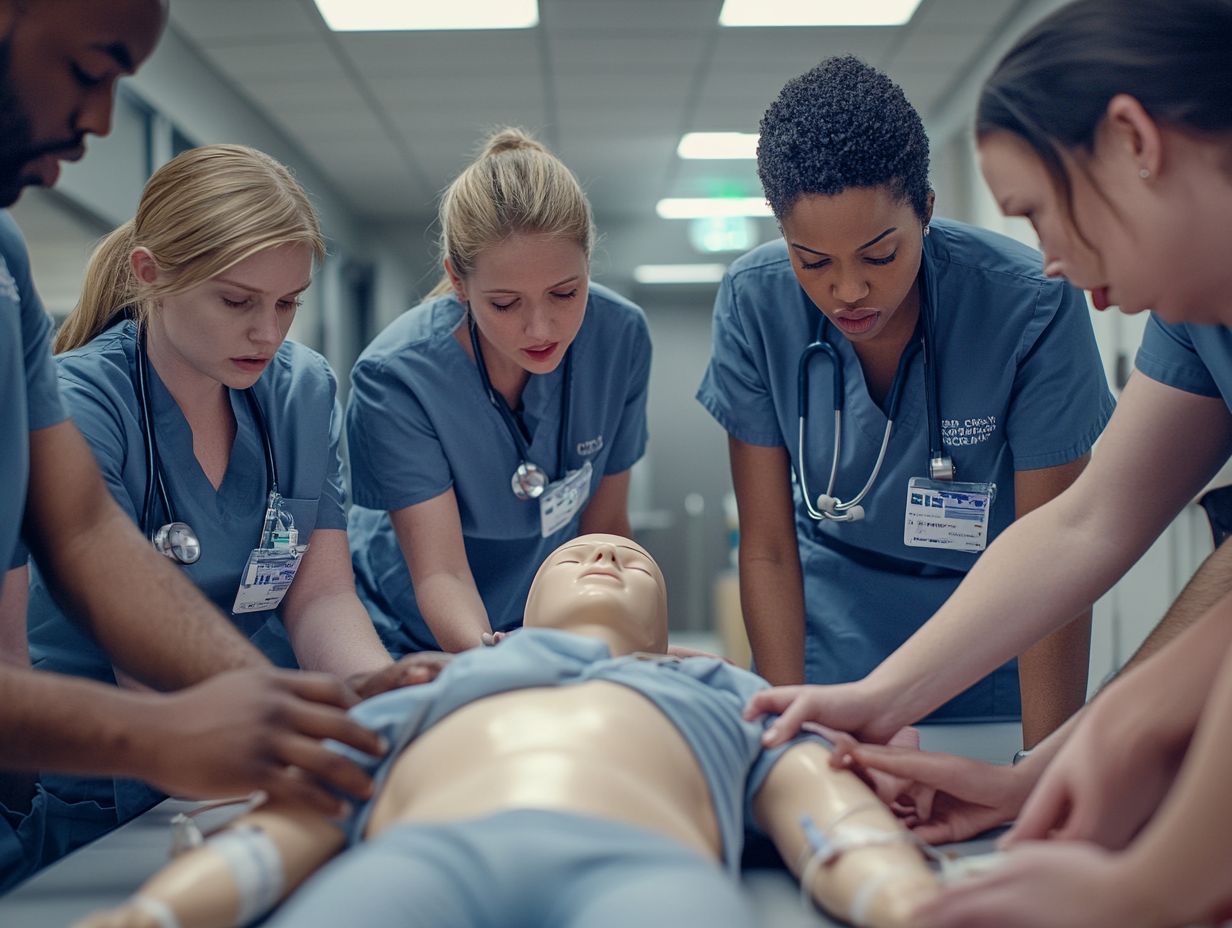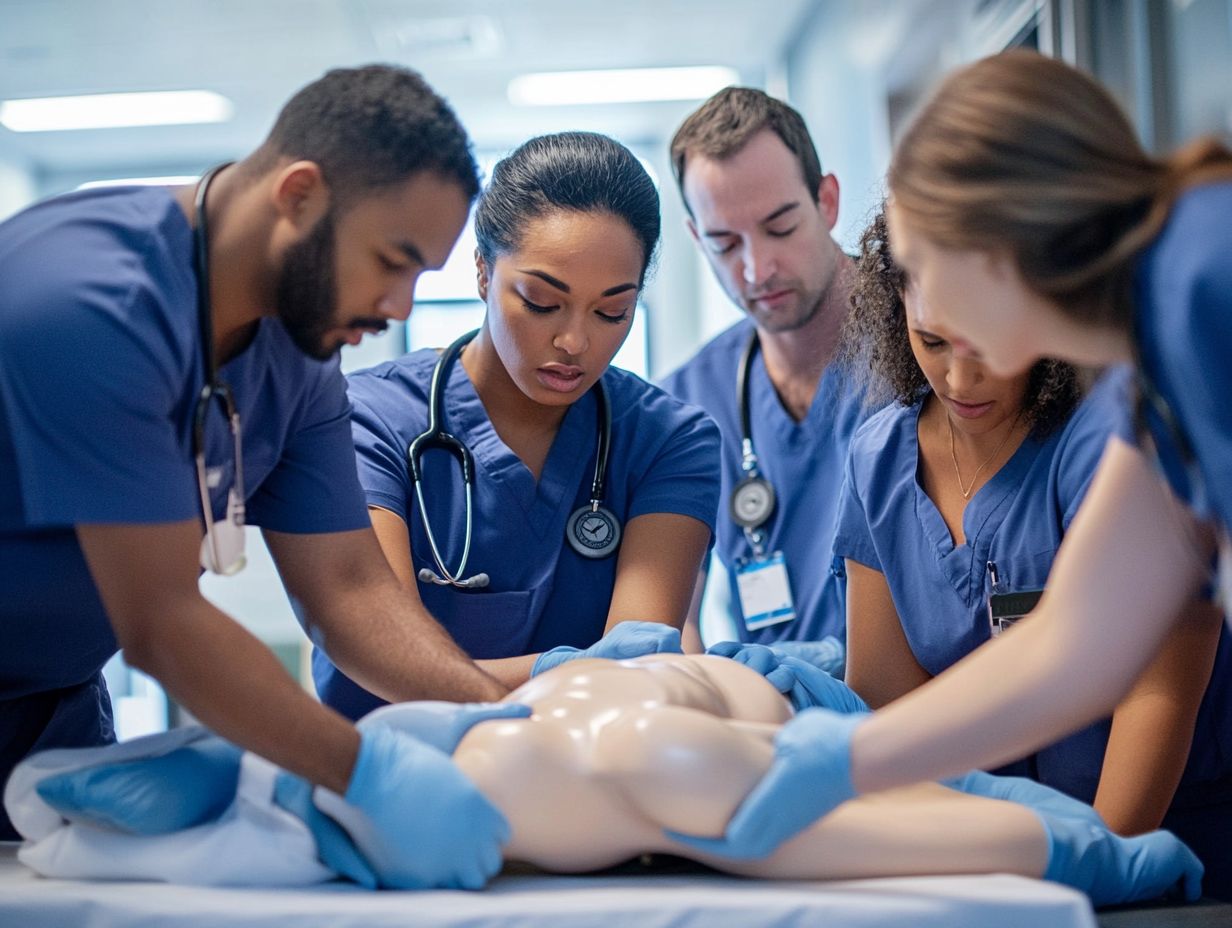The Importance of CPR Certification in Healthcare
In the fast-paced realm of healthcare, obtaining CPR certification is an essential credential. It empowers professionals with life-saving skills and elevates the standard of patient care.
Grasping what CPR certification encompasses, along with its myriad benefits and the process of acquiring and maintaining it, is crucial for anyone in this field.
This article delves into the significance of CPR training, its influence on patient outcomes, and the necessity of remaining certified as a healthcare provider.
Discover how being CPR certified can make a life-saving difference in emergency situations.
Contents
- Key Takeaways:
- What is CPR Certification?
- Benefits of CPR Certification in Healthcare
- How to Get CPR Certified
- Maintaining CPR Certification
- The Role of CPR Certification in Emergency Situations
- Frequently Asked Questions
- What is the Importance of CPR Certification in Healthcare?
- How does CPR Certification benefit healthcare professionals?
- Do all healthcare professionals need to be CPR certified?
- What are the benefits of being CPR certified in a non-clinical healthcare setting?
- How often should healthcare professionals renew their CPR certification?
- Where Can I Get CPR Certified as a Healthcare Professional?
Key Takeaways:

- CPR certification is a vital skill for healthcare professionals, as it can greatly improve patient outcomes and help meet industry requirements.
- Proper CPR training and certification are necessary for maintaining knowledge and skills.
- Renewing certification ensures preparedness in emergency situations.
- Being CPR certified can mean the difference between life and death, making it a crucial skill for healthcare professionals.
What is CPR Certification?
CPR certification serves as formal recognition that you have successfully completed the essential training to perform CPR competently and in alignment with established guidelines.
This certification is crucial for healthcare professionals like nurses and physicians, as it equips you with lifesaving skills critical in emergencies, such as cardiac arrest.
The training covers more than just CPR techniques; it also includes the proficient use of a defibrillator a device that gives electric shocks to the heart and the execution of rescue breathing.
As a result, you significantly enhance the chances of patient survival during those critical moments.
Benefits of CPR Certification in Healthcare
The advantages of CPR certification in healthcare are extensive. It profoundly influences patient outcomes and elevates the capacity of healthcare professionals to respond effectively in emergencies.
When you obtain CPR certification, you gain essential knowledge and skills vital for managing cardiac arrest situations and other medical crises. This training boosts your confidence in CPR. It also helps create a culture of readiness in healthcare settings, ultimately making a safer environment for both patients and staff.
Improving Patient Outcomes
Improving patient outcomes is your ultimate goal with CPR certification. It equips you with the essential skills needed for effective emergency responses in critical situations like cardiac arrest.
Research shows that performing CPR promptly can double or even triple a victim’s chances of survival. This emphasizes that every second truly matters in these emergencies.
A compelling case study revealed that when trained bystanders intervened during the first few minutes of cardiac arrest, survival rates skyrocketed to 40%. In stark contrast, rates plummeted when immediate resuscitation was absent.
By mastering CPR techniques such as chest compressions and rescue breaths you not only enable yourself as a healthcare professional but also gain the confidence to assist as a layperson.
Ultimately, the collective knowledge and swift action of trained individuals can be the decisive factor between life and death. This highlights the critical importance of comprehensive CPR training at every level of healthcare provision.
Don t wait! Get your CPR certification today and be ready to save lives!
Meeting Industry Requirements

Meeting industry requirements through CPR certification is essential for you, a healthcare professional, especially since many healthcare facilities mandate such training to comply with safety regulations and standards.
This certification not only equips you with life-saving skills but also highlights your commitment to patient safety and quality care.
Different healthcare settings may have varying requirements based on their unique environments. For instance, hospitals often necessitate higher levels of training compared to outpatient clinics.
Ongoing training and renewing your certification are essential to keep your skills sharp.
Organizations like the American Heart Association play a pivotal role in establishing these certification standards, offering comprehensive courses that reflect contemporary practices in emergency cardiovascular care. Their involvement ensures that you have up-to-date knowledge to respond effectively during critical situations.
How to Get CPR Certified
Ready to save lives? Getting CPR certified is your first step! Obtaining CPR certification requires an in-depth training process that can be pursued through various avenues, such as in-person classes, online courses, or a blend of both.
Most CPR training programs are meticulously crafted to equip you with essential life-saving skills, including chest compressions, rescue breathing, and the correct use of an AED (a device that helps restart the heart).
Once you’ve successfully completed a CPR training course, you ll receive a certification that validates your ability to perform CPR during emergencies.
Training and Certification Process
The training and certification process for CPR is designed to blend theoretical knowledge with hands-on skills training, ensuring you can confidently apply CPR techniques in real-life emergency situations. Courses can last a few hours to several days, depending on the level of detail and the specific certification you re pursuing.
You’ll engage in comprehensive modules that cover essential topics, including:
- The anatomy of the heart,
- The importance of early defibrillation,
- The significance of high-quality chest compressions.
Practical assessments are vital, allowing you to showcase your proficiency in simulated emergency scenarios. Retaining these skills is crucial; as a healthcare provider, it’s advisable to participate in regular refresher courses to reinforce your knowledge and stay up-to-date with any changes in protocols.
Continuing education not only ensures compliance with healthcare regulations but also enhances your confidence and readiness when confronting real-life emergencies.
Maintaining CPR Certification
Maintaining CPR certification is vital for ensuring that healthcare professionals stay competent and ready to respond effectively to medical emergencies.
Renewing your CPR certification typically requires periodic retraining, which not only refreshes your essential skills and knowledge but also keeps you updated on the latest CPR guidelines and techniques.
This ongoing education not only reinforces immediate aid’s importance but also helps you retain vital knowledge.
Renewal Requirements and Importance

Renewal requirements for CPR certification are designed to ensure you, as a healthcare professional, maintain your skills and stay updated on current CPR practices and guidelines.
Typically, certification bodies require that you renew your credentials every two years, though some organizations might have different timelines. It s crucial for you to keep track of your certification status to prevent any lapses.
Neglecting these deadlines can lead to serious consequences, including difficulties in complying with healthcare regulations. Let s not underestimate the potential impact on patient safety; outdated CPR knowledge could impede your ability to respond effectively during emergencies, ultimately jeopardizing patient outcomes when every second truly matters.
Don’t let your skills fade. Renew your certification today to ensure you’re always ready to act!
The Role of CPR Certification in Emergency Situations
The importance of CPR certification in emergency situations is paramount. It provides you with lifesaving skills essential for effectively responding to critical incidents like cardiac arrest.
In high-pressure environments, your ability to perform cardiopulmonary resuscitation (CPR) techniques with confidence can mean the difference between life and death. Those trained in CPR can act swiftly and decisively, enhancing patient outcomes during emergencies.
Saving Lives and Reducing Risks
Saving lives and reducing risks is the essence of CPR certification. It equips you, as a healthcare worker, with the vital knowledge and skills needed to intervene effectively in emergencies.
When CPR is given quickly, survival rates can reach 40%! This is a stark contrast to the disheartening 10% or lower survival rates when it s absent. This remarkable difference highlights the critical importance of training not just in teaching lifesaving techniques but also in fostering an environment where patient safety is a priority.
By enhancing your confidence and ability to act decisively, you can improve overall healthcare outcomes. This ensures that those in distress receive the timely care they urgently need.
The Importance of Being CPR Certified in the Healthcare Field
The significance of being CPR certified in the healthcare field cannot be overstated. It ensures that you, as a medical professional, are prepared and capable of managing emergencies effectively.
This training goes beyond just being ready; it represents a profound commitment to preserving life. By obtaining CPR certification, you pledge to uphold a standard of care that directly influences patient outcomes, showcasing your dedication to saving lives during critical moments.
Being certified builds trust in your team and the healthcare system. This certification not only boosts your confidence but also enhances the overall effectiveness of emergency response protocols, fostering a safer environment for both patients and staff.
In this manner, CPR training plays a vital role in cultivating a culture of safety that benefits the entire healthcare community.
Frequently Asked Questions

What is the Importance of CPR Certification in Healthcare?
The importance of CPR certification in healthcare is immense. It serves as a crucial lifesaving skill that can be used in emergencies when a person’s heart has stopped or they have stopped breathing. In the healthcare field, having CPR certification demonstrates that a person is trained and competent in providing immediate and effective CPR to patients in need, highlighting the importance of continuing education in healthcare.
How does CPR Certification benefit healthcare professionals?
CPR certification benefits healthcare professionals by equipping them with the knowledge and skills needed to respond quickly and effectively in emergencies. It ensures they are up-to-date with the latest techniques and guidelines, allowing them to provide the best possible care to their patients.
Do all healthcare professionals need to be CPR certified?
While it may not be a requirement for all healthcare professionals, having CPR certification is highly recommended for anyone working in the healthcare industry. This includes doctors, nurses, paramedics, dental professionals, and even medical students. Being CPR certified can make a significant difference in saving a patient’s life in critical situations.
What are the benefits of being CPR certified in a non-clinical healthcare setting?
Being CPR certified in a non-clinical healthcare setting, such as a fitness center or a school, offers many benefits. It helps create a safer environment and increases confidence in handling emergencies. It also shows that the organization or institution takes the well-being of their clients or students seriously.
How often should healthcare professionals renew their CPR certification?
The American Heart Association recommends that healthcare professionals renew their CPR certification every two years. This ensures they are knowledgeable about any updates or changes in techniques while maintaining their skills and staying prepared for potential emergencies.
Where Can I Get CPR Certified as a Healthcare Professional?
CPR certification courses are easy to find. Organizations like the American Heart Association and the American Red Cross offer them.
Many hospitals also provide CPR training for their staff. Make sure the course is recognized and the certification meets the requirements for your field.






